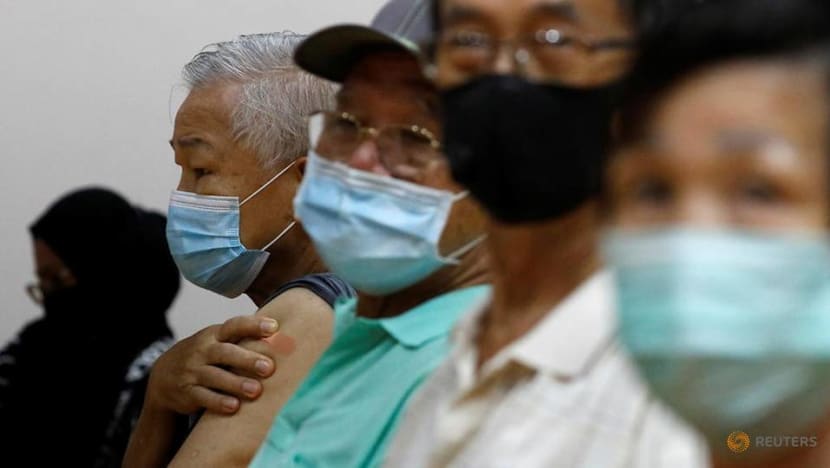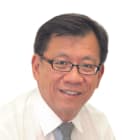Commentary: ‘Moving on’ from COVID-19 may not be possible for some people
No matter how eager many in Singapore are to put the pandemic behind us, more can be done to protect our vulnerable from COVID-19, says infectious disease specialist Leong Hoe Nam.

Seniors waiting their turn to get the COVID-19 vaccination in Singapore. (Photo: Reuters)

This audio is generated by an AI tool.
SINGAPORE: Mr Chia* was rushed to the hospital one late evening, feeling breathless, weak and confused. He had been having a fever for two days and the pulse oximeter read a low 84 per cent. His family’s worst fears were confirmed when the COVID-19 self-test kit showed the familiar two red lines.
He was already bravely battling colon cancer, which progressed ruthlessly despite chemotherapy. With COVID-19, the once cheerful and witty 84-year-old man was now confined in bed, barely interested in his surroundings, eating morsels of food every day supplemented with milk.
The fight of the COVID-19 pandemic that began in 2020 is far from over. As the country moves into living with endemic COVID-19, reported cases rose and ebbed with episodic waves.
After a new wave in the closing weeks of 2023, estimated at 58,300 cases in one week of December, the numbers look to have peaked. But when will the next one come again?
Of the 226 COVID-19 deaths between January and October 2023, 210 were aged 60 years and older. The virus remains a serious threat with major health risks for older adults and those with chronic conditions, such as cardiovascular disease, high blood pressure, cancer and diabetes.
Research has shown that they are more likely to get very sick from COVID-19 and be hospitalised. The risk of death increases as the number and severity of underlying conditions increase.
The spikes in hospitalisations and deaths aren’t as scary as they were in 2020 and 2021. The younger healthy among us may have fully moved on from the pandemic, masks and safe distancing rules discarded, revenge travel in full swing.
COVID-19 couldn't be more distant from the minds of many. Yet, it remains a significant healthcare challenge for the vulnerable populations.
SOME GROUPS REMAIN APPREHENSIVE ABOUT COVID-19
Some remain apprehensive about COVID-19. They may be immunocompromised and are unable to be vaccinated or have a reduced immune response to vaccines.
The constant fear of contracting COVID-19 in some has kept them homebound and reduced their outside world contact to only the occasional phone call. These fears have a significant impact on the mental health of individuals, from anxiety to depression, helplessness to frustration, and their overall well-being has been severely affected.
We should take their concerns seriously.
In addition to safety, the economic costs of neglecting these groups may be severe. According to a report by pharmaceutical company MSD, the cost burden of COVID-19 in the Asia-Pacific remains high and is unevenly distributed across population segments and industries.
Vulnerable populations such as those over 60 or 65 years (depending on the market) and younger adults with one or more comorbidities are likely to be disproportionately impacted by COVID-19, bearing about 40 per cent to 50 per cent of total economic costs.
In Singapore, the analysis predicted that COVID-19 infections in the older population account for about S$565 million annually, or 16 per cent of all direct and indirect costs combined.
Needless to say, the financial hardship and isolation prompted by ongoing COVID-19 outbreaks may further compound the challenges that Singapore’s elderly community face regarding isolation and loneliness.
LAYERS OF PROTECTION FROM VACCINES AND ORAL ANTIVIRALS
How can Singapore protect those at risk, and fend off a rapidly mutating virus? This is best achieved through multiple layers of protection.
Vaccines remain important as the first line of defence, but sole reliance on them is akin to putting all of our eggs in one basket. Despite rapid adaption of the mRNA vaccine to prevailing circulating strains, vaccine manufacturers are continually at least three to four months behind.
While the emergence of the Omicron variant was first announced by the World Health Organization in late 2021, it was close to a year later that targeted vaccines were authorised in Singapore. We are already seeing the new strain JN.1 mutating significantly against the XBB.1.5 variant vaccine that was introduced in Singapore barely three months ago.
Oral antivirals are an important and effective second line. In Singapore, there are two oral treatments for COVID-19: The Health Sciences Authority (HSA) has approved Pfizer’s Paxlovid, a combination of nirmatrelvir and ritonavir; MSD’s molnupiravir, branded as Lagevrio, was granted interim authorisation during the pandemic. These have been shown repeatedly to reduce hospitalisation risk, pneumonia and death.
Early use of oral antivirals may further curb secondary transmission to close contacts. A cohort study suggested that they can reduce the risk of long COVID by 14 per cent to 26 per cent. A recent large-scale study conducted in South Korea demonstrated a preventive effect against severe and critical illness or death, with a better treatment effect corresponding to increasing patient age.
But these oral antiviral agents are not currently offered routinely to the at-risk population. We risk missing out on the benefits in reducing the burden on the healthcare system.
PROTECTING THE VULNERABLE AMONG US
Singapore has been living alongside COVID-19 and other endemic diseases like the seasonal flu. However, COVID-19 is still a relatively new disease and our understanding of the virus is evolving.
An often-ignored parameter is the quality of life after an episode of infection. Research has shown time and time again that after an infection, an elderly person falls stepwise and fails to fully recover pre-morbid function, pushes them down the frailty scale.
Mr Chia recovered from his COVID-19 infection. But in the next two to three weeks, he grew weaker as he struggled with breathlessness and refused to eat. He died almost a month after recovering from COVID-19.
No matter how eager we are to put COVID-19 behind us in the new year, we can still do more to comprehensively protect Singapore from the worst effects of the virus and safeguard our vulnerable populations.
*Pseudonyms were used in this commentary.
Dr Leong Hoe Nam is an Infectious Disease Specialist at the Rophi Clinic at Mount Elizabeth Novena Hospital.


















